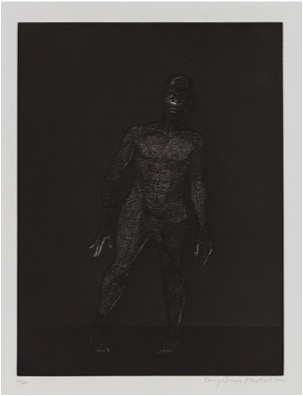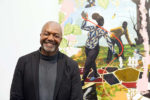
Kerry James Marshall
American, 1955-
Frankenstein, 2010
hardground etching
15 7/8 x 11 7/8 in.
SBMA, Museum Purchase with funds provided by the Cohn Acquisition Fund
2012.5.1

Kerry James Marshall at the Museum Ludwig in front of his work: Vignette #15, 2014 © Kerry James Marshall, Photo: Jürgen Schulzki
In a talk he gave at the Museum of Contemporary Art Chicago five years ago, Kerry James Marshall displayed a photograph of his studio—a place, he told his audience, his wife calls “the playhouse.” It’s “where I like to go,” he said, “and I like to go there every day, because there is nothing more satisfying, really, than solving the problem of: how do you get more work that has the black figure in it into museums around the world?”
COMMENTS
Kerry James Marshall has long chronicled the African American experience. His large, narrative paintings feature only black figures—celebratory assertions of blackness in a medium in which African Americans have often been invisible— and his exploration of art history stretches across the canon and beyond. The result is a visually stunning body of work, both intimate and monumental.
Marshall’s painting, sculptural installations, collage, video, and photography seek to reveal “black existential realities without sacrificing a sense of majesty.” Born in the Jim Crow South, he moved to South Central Los Angeles in 1963—two elements that strongly influenced the foundation of social responsibility in his practice. Art history and elements of high and low art are woven into his works, uncovering storylines of black history often ignored by the Western art canon. Integrating visual cues from black folk art, the Renaissance, and comic books, among others, he addresses black identity and representation with figures that are “unequivocally, emphatically black.” He questions the impact of money on these renderings, using symbols of power and access to address subjects including sexuality and power. Marshall’s unflinching dedication to “confronting racial stereotypes, race-based economic disparities, and African mythologies” provokes his viewer to acknowledge the transgressions of the past to reimagine their own present.
Marshall has had his work exhibited at institutions including Studio Museum in Harlem, New York, Cleveland Center for Contemporary Art, Ohio, Kunsthal Charlottenburg, Copenhagen, Brooklyn Museum, New York, San Francisco Museum of Art, California, Institute of Contemporary Art, Boston, Antoni Tapies Foundation, Barcelona, Museum of Contemporary Art, Chicago, Baltimore Museum of Art, Maryland, Museo Centro de Arte Reina Sofia, Madrid, the Metropolitan Museum of Art, New York, and the Wexner Center, Columbus, Ohio, among many others. He participated in the Whitney Biennial in 1997, the Venice Biennale in 2003 and 2015, and the Gwangju Biennale in 2009. He was the winner of a MacArthur Foundation Grant in 2007, a Yale University Fellowship in 2011, and the Wolfgang Hahn Prize by Museum Ludwig in 2014, to name a few.
artspace.com
